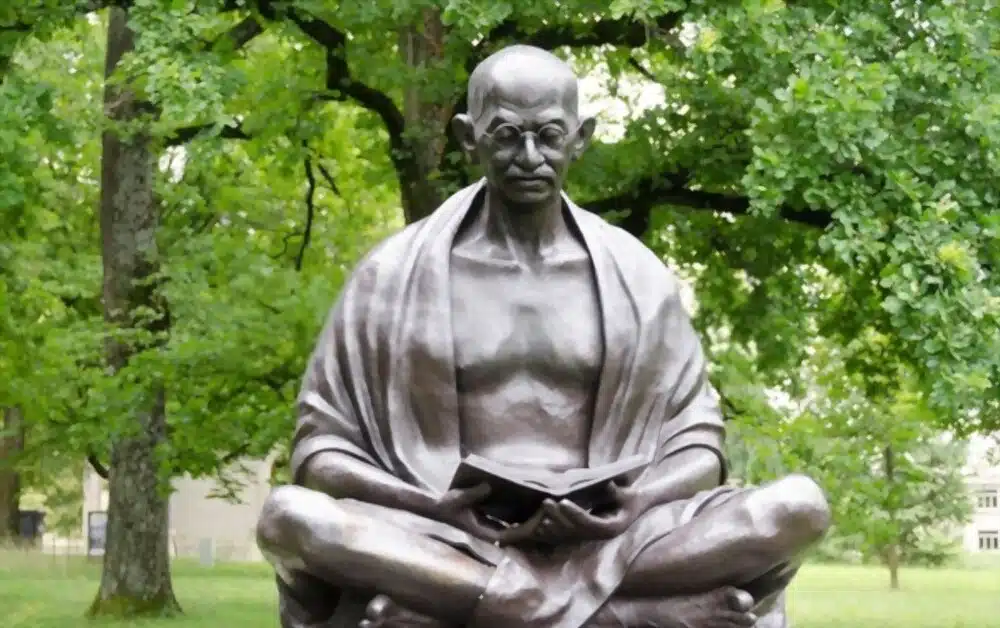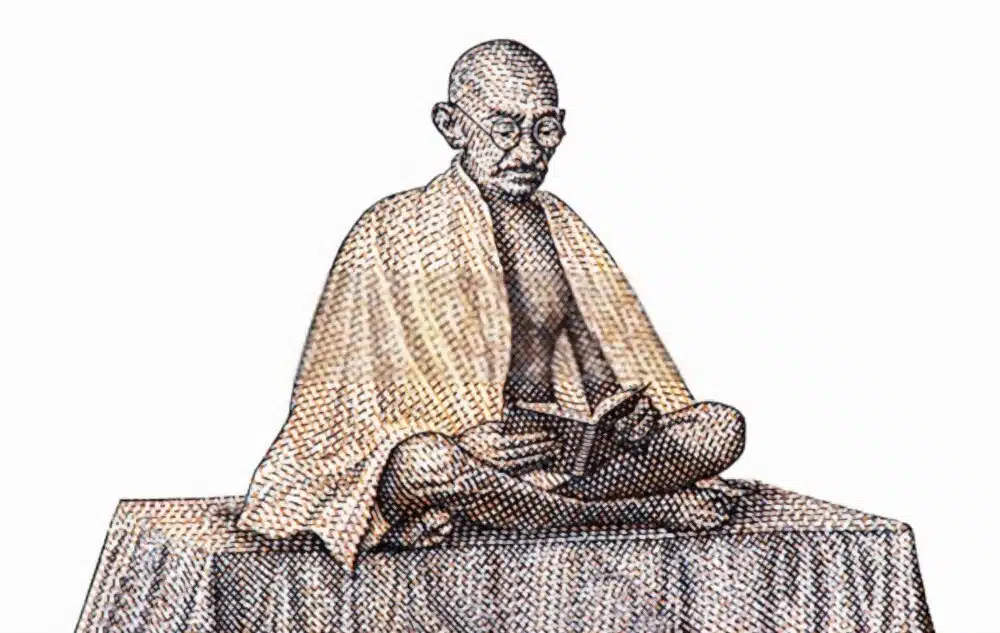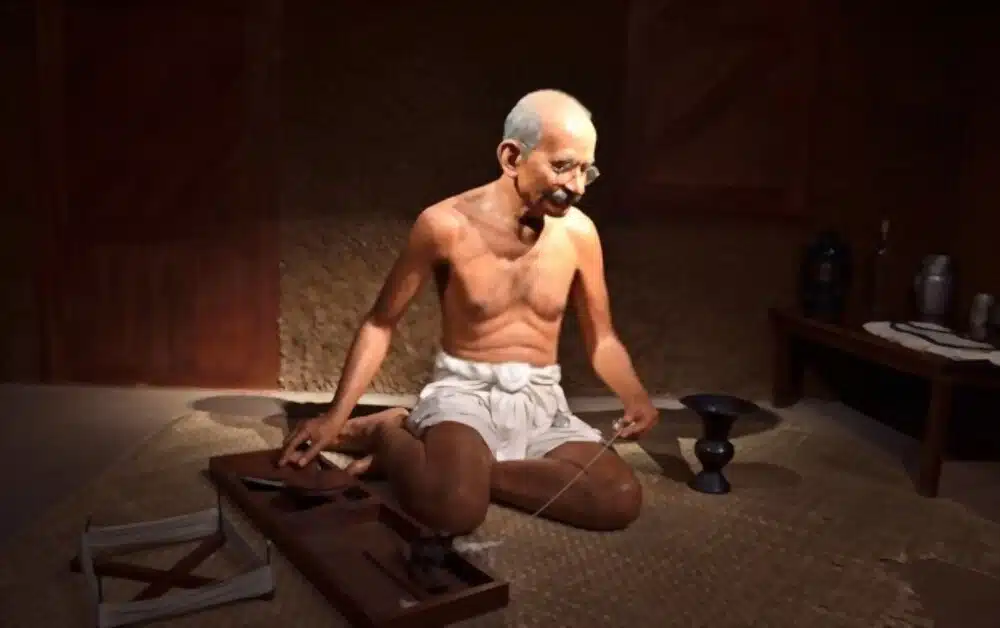
The following content is ideal for all class students, parents and teachers who are searching for Essay on Moral Values of Mahatma Gandhi
10 LINES on Moral Values and Principles of Mahatma Gandhi lines for Classes
- Mahatma Gandhi was a great leader who taught us the importance of moral values and principles in our lives.
- He believed in the principle of non-violence and encouraged people to solve their problems peacefully.
- Gandhi taught us to treat every human being with respect and dignity, irrespective of caste, religion, or social status.
- He believed in the power of truth and honesty.
- He always encouraged people to speak the truth.
- Gandhi also emphasised the importance of simplicity in life.
- He encouraged people to work hard and be self-reliant.
- Gandhi believed in the concept of self-discipline and taught us to control our thoughts and actions.
- He told the importance of education and believed that it was the key to personal and social development.
- Gandhi taught us to be kind and compassionate towards all living beings, including animals.
Also Read:
- Lines about Mahatma Gandhi (5 ,10 ,15 lines)
- Paragraph on Mahatma Gandhi in English
- Essay on Mahatma Gandhi in English
- Essay on Fundamental Duties of India
- Essay on Bal Gangadhar Tilak in English

Essay on Moral Values and Principles of Mahatma Gandhi for Classes 3 and 4 – 100 Words
Mahatma Gandhi was a great leader and his moral values and principles still inspire people across the world. Some of his key principles were non-violence, truthfulness, simplicity, self-discipline, and respect for diversity. He believed that violence only increases violence and that conflicts could be resolved through peaceful means. Gandhi highlighted the importance of truthfulness in all aspects of life. Self-discipline was another important principle for Mahatma Gandhi.
He believed that one should have control over one’s own thoughts and actions. Simplicity was another core value that he lived by throughout his life. He believed in leading a simple lifestyle and avoiding materialistic pursuits.
Essay on Moral Values and Principles of Mahatma Gandhi for Classes 5 and 6 – 150 Words
Mahatma Gandhi was not only a political leader but also a symbol of moral values. He believed in truth, non-violence, compassion, and humility. Gandhi believed in the power of truth and always spoke his mind fearlessly. He believed that non-violence is the greatest force for good and it can bring about lasting change in society.
He lived a simple life with respect for all forms of life. One of the most important moral principles he addressed was self-discipline or ‘self-rule’. True freedom comes from within when one has complete control over one’s own thoughts and actions. He highlighted the importance of equality among all individuals.
He didn’t believe in caste, creed or religion. He fought against untouchability and discrimination against women throughout his life. Mahatma Gandhi’s morals were deeply rooted in spirituality. True spirituality is considered as an essential part of human existence.
His teachings are still relevant today as we struggle to live together harmoniously in diverse societies around the world.

Essay on Moral Values and Principles of Mahatma Gandhi – 250 Words
Mahatma Gandhi is known as one of the most influential figures in Indian history and a leader. He advocated for non-violent civil disobedience to attain independence for India. His philosophy of non-violence, honesty, truthfulness, and compassion has inspired millions around the world. Gandhi placed immense importance on ahimsa or non-violence as a means to resolve conflicts peacefully without any loss of life or property.
Mahatma Gandhi believed that morality was not something that could be imposed upon individuals through laws or rules but should be cultivated through self-discipline and introspection. For him, moral values were rooted in spirituality and inner peace which he called “Satyagraha”.
Satyagraha means holding onto Truth even when it seems impossible.
In today’s fast-paced world where people are driven by greed and selfishness, Mahatma Gandhi’s message of morality is more relevant than ever before. We need leaders who realise these values in their personal lives as well as in their public roles if we are to build a society based on justice and equity.
The teachings of Mahatma Gandhi serve as an eternal reminder of what it truly means to lead a meaningful life filled with purpose, integrity, and compassion.
In conclusion, Mahatma Gandhi remains an icon of moral excellence whose teachings continue to inspire generations across the globe.
He saw morality as an integral component necessary for building strong societies founded on justice, equality to support freedom, independence, secularism and socialism etc.
Essay on Moral Values and Principles of Mahatma Gandhi for Classes 5 and 6 – 300 Words
Mahatma Gandhi was a man who lived his life based on strong moral values and principles. He believed that every individual should live their life with honesty, integrity, and compassion towards others. For him, the path of truth and non-violence were essential components of living an ethical life. Gandhi’s belief in non-violence has been one of his most important contributions to humanity.
He believed that violence only causes more violence. Through Peaceful ways, we can resolve conflicts. His philosophy inspired many leaders around the world during the civil rights movement, including Martin Luther King Jr. Another important moral value for Gandhi was that he lived a life so simple. He led a simple lifestyle himself, wearing traditional Indian clothing and leading a frugal life without any luxuries or material possessions. One of the most important moral values is that Gandhi was truthful.
He believed in speaking the truth no matter what the consequences may be. For him, honesty was one of the important pillars on which society should be built. Mahatma Gandhi also placed huge importance on compassion and empathy towards others’ suffering.
According to him, every human being should work to reduce others’ pain as much as possible. His humility made him relatable to people from all walks of life. Furthermore, Gandhi also emphasised the importance of self-discipline as he believed this would lead to personal growth and success both spiritually and professionally.
By practising self-control over our thoughts, words, and actions we are better able to achieve our goals while staying true to our core values. In conclusion, Mahatma Gandhi’s teachings continue to inspire generations even after his death because they promote values like love for fellow beings irrespective of social status or caste discrimination-free society equality between men & women etc., which remain relevant even today amidst changing times!

Essay on Moral Values and Principles of Mahatma Gandhi for Senior Students- 400 + Words
Introduction
Mahatma Gandhi, one of the most reviled figures in Indian history, was not just a political leader but also a personification of moral values and principles. He was Known for his non-violent approach to activism. He inspired millions around the world with his ideals of truthfulness, compassion, and integrity.
Who was Mahatma Gandhi?
Mahatma Gandhi was an Indian independence activist, who is widely recognized as one of the greatest and most influential leaders in modern history. Born on 2nd October 1869 in Porbandar, a coastal town in present-day Gujarat, he grew up to become a politically important figure and social reformer.
Gandhi’s early years were marked by his love for truth and justice, which shaped his worldview on morality and ethics. He studied law in London and later worked as a lawyer in South Africa where he developed his philosophy of nonviolent resistance or Satyagraha.
Upon returning to India, Gandhi became actively involved in the Indian freedom struggle against British colonial rule. He led several successful campaigns such as the Salt March that resulted in India gaining its independence from Britain.
Throughout his life, Mahatma Gandhi remained committed to promoting peace and tolerance among people of different faiths and cultures. His teachings on non-violence have inspired countless individuals around the world including civil rights leader Martin Luther King Jr., and anti-apartheid revolutionary Nelson Mandela among others.
What were Gandhi’s views on morality and ethics?
Morality- Mahatma Gandhi was a man of high moral character, and his views on morality and ethics were deeply rooted in his spiritual beliefs. For him, morality was not just a set of rules or principles to be followed; it was a way of life that reflected one’s innermost values.
Self-Realisation- According to Gandhi, the ultimate goal of human life is to attain self-realisation or enlightenment. This can only be achieved by living a moral and ethical life, based on truthfulness, non-violence, compassion, and service to others.
Introspection and Meditation- Gandhi believed that true morality comes from within oneself rather than being imposed from external sources such as religion or society. He saw each individual as having a natural sense of right and wrong which could be cultivated through introspection and meditation.
Truthfulness- For Gandhi, truthfulness was the foundation of all moral behaviour. He believed that one should always speak the truth regardless of the consequences. Non-violence too played an important role in his philosophy as he saw it as another evidence of truthfulness. Mahatma Gandhi’s views on morality were founded upon deep spiritual beliefs centred around truthfulness and nonviolence.
How did Gandhi’s beliefs shape his actions?
Gandhi’s beliefs had an intense impact on his actions and the course of India’s fight for independence. One of Gandhi’s core principles was nonviolence, which he believed could bring about change without resorting to aggression or hatred.
This belief in non-violence led him to undertake various forms of peaceful resistance, such as civil disobedience and hunger strikes. He believed that these methods would not only help achieve political goals but also promote spiritual growth among individuals.
Another important principle for Gandhi was self-reliance, which he called “swaraj.” He encouraged Indians to become more self-sufficient by promoting local industries and rejecting foreign goods. This idea aimed at reducing India’s dependence on British rule.
Furthermore, Gandhi emphasised the importance of equality and social justice. He fought against caste discrimination and worked towards empowering women through education. His views on these issues were ahead of his time, inspiring future generations.
It is evident that Gandhi’s beliefs shaped every aspect of his life and work towards achieving a free India based on moral values rather than violence or oppression.
What lessons can we learn from Gandhi about morality and ethics?
Mahatma Gandhi’s life and teachings offer a number of lessons about morality and ethics. These are the lessons which we can apply in our daily lives. One of the most important lessons is the power of non-violence. Gandhi showed us that violence only leads to more violence.
Another lesson we can learn from Gandhi is the importance of self-discipline. He believed that a person must have control over their thoughts, words, and actions to win the world.
Gandhi also believed in treating everyone with respect, regardless of their background or social status. He advocated for equality among all people and fought against discrimination based on caste or religion.
Gandhi emphasised the value of simplicity and living a sensible lifestyle. He also encouraged others to live simple lives.
There are many valuable lessons we can learn from Mahatma Gandhi about morality and ethics such as non-violence, self-discipline, respect for others, and simplicity.
Conclusion
Mahatma Gandhi was not just a political leader but also a moral and ethical philosopher who inspired millions with his principles and values. He believed in the power of non-violence, truthfulness, compassion, humility and simplicity. These values helped him to lead India to independence from British rule.
Gandhi’s teachings on morality and ethics are still relevant today. They remind us that we must strive for goodness, kindness and justice in all our actions. We can learn from his life how to live an honest, simple and fulfilling life without compromising on our principles.
FAQs
1. Is Mahatma Gandhi’s values and principles diminishing and portrayed in a negative way?
Answer – Not at all! Mahatma Gandhi’s values and principles are still alive, respected, and appreciated by many people around the world. His message of peace and non-violence is still relevant today. As long as we continue to remember his moral values and principles, they will not diminish or lose their importance in any way. Though there are a few people who are over-smart and want to show that they know more than anyone. For such people, there is no good principle. Such people may criticize the values.
2.What was Mahatma Gandhi’s philosophy on moral values and code of conduct?
Answer – Mahatma Gandhi was a strong advocate of non-violence, justice, and truth. He believed that people should live their lives with the highest moral values, such as courage, kindness, truthfulness, and empathy. He also believed in the power of forgiveness, selflessness, and service to others. He advocated for a life lived in harmony with nature and promoted satyagraha (insistence on truth) as a form of civil disobedience against oppression. His fundamental principles of morality include ahimsa (non-violence), swadeshi (self-sufficiency) and Sarvodaya (the welfare of all).
3.What are some of Mahatma Gandhi’s principles?
Answer – Mahatma Gandhi’s principles were founded on truth, non-violence, and equality. He believed in the power of peaceful protest, ethical and moral responsibility, respect for all life, and self-sacrifice in service to others. He also preached truthfulness and humility as keys to a fulfilling life. In his practice of Satyagraha, he emphasised that civil disobedience is only justified when used as a last resort to fight injustice.
4.Who was Mahatma Gandhi and what were his principles?
Answer – Mahatma Gandhi was a political and spiritual leader who played a significant role in India’s struggle for independence from British colonial rule. He was born on October 2, 1869, in Porbandar, India, and was assassinated on January 30, 1948, in New Delhi, India. Gandhi’s principles were rooted in his philosophy of nonviolence, which he called Satyagraha, his deep commitment to social justice and his belief in the equality of all people, regardless of their race, caste, or religion, believed in the importance of simplicity and self-sufficiency.